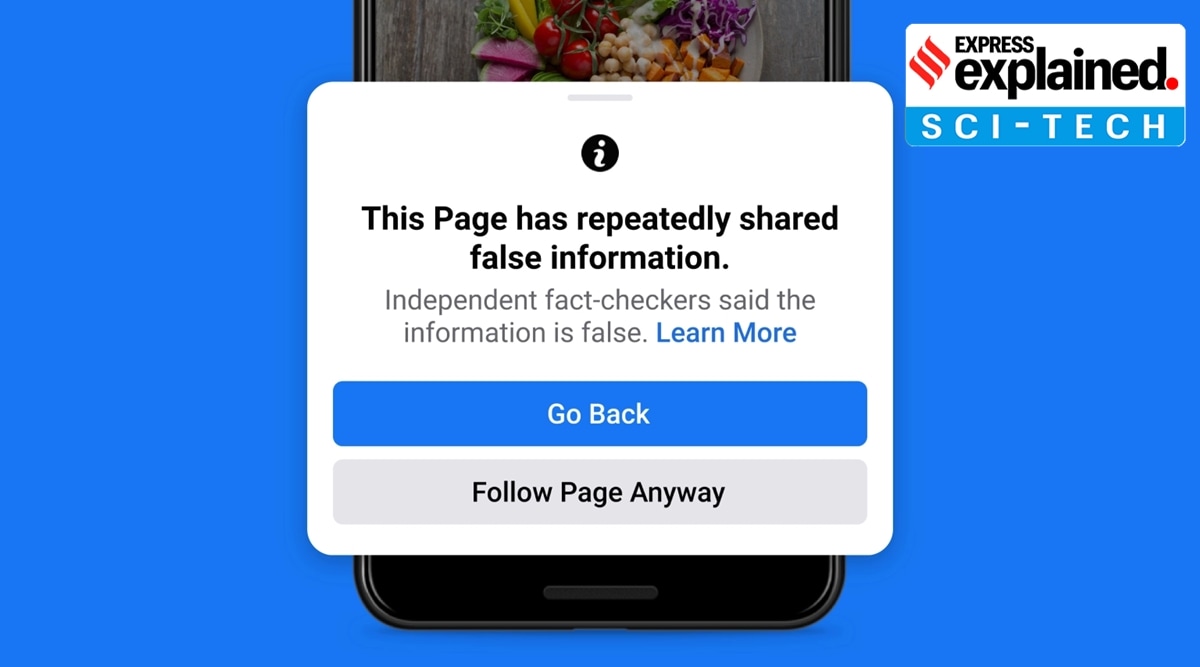Explained: How new Facebook feature flags misinformation
Facebook will reduce the distribution of all posts in News Feed from an individual’s account if they repeatedly share content that has been rated by one of its fact-checking partners.
 Facebook will now tag a page that has been repeatedly sharing information flagged by fact-checkers.
Facebook will now tag a page that has been repeatedly sharing information flagged by fact-checkers. On the lines of Twitter’s tool to flag posts with false information, social networking giant Facebook has kicked off a new way to inform people if they’re interacting with content that’s been rated by a fact-checker. “Whether it’s false or misleading content about COVID-19 and vaccines, climate change, elections or other topics, we’re making sure fewer people see misinformation on our apps,” Facebook said in a blog post.
Newsletter | Click to get the day’s best explainers in your inbox
What is Facebook changing?
Facebook has mainly brought in three new changes. Firstly, it will tag a page that has been repeatedly sharing information flagged by fact-checkers. Secondly, it is expanding penalties for individual Facebook accounts to reduce viral misinformation. And lastly, it has redesigned the notifications that people get when they share content that has been flagged by fact-checkers.
How will Facebook flag pages sharing misinformation?
When a user goes to a Facebook page that has been repeatedly flagged by its fact-checkers to like it, the social networking portal will give a prompt saying “This Page has repeatedly shared false information”. Users can also click on the said prompt to learn more, including that fact-checkers said some posts shared by this Page include false information and a link to more information about the fact-checking program. Facebook says this will help people make an informed decision about whether they want to follow the Page.
 Facebook has engaged several fact-checking partners.
Facebook has engaged several fact-checking partners.
What are the new penalties for those sharing false information?
Facebook will reduce the distribution of all posts in News Feed from an individual’s account if they repeatedly share content that has been rated by one of its fact-checking partners. Currently, it reduces a single post’s reach in News Feed if it has been debunked. Earlier, Facebook took action against Pages, Groups, Instagram accounts and domains sharing misinformation and now, it is expanding this to include penalties for individual Facebook accounts too.
How is Facebook redesigning notifications for sharing of fact-checked information?
Currently, Facebook notifies people when they share content that a fact-checker later rates. The new notification includes the fact-checkers article debunking the claim as well as a prompt to share the article. It also includes a notice that people who repeatedly share false information may have their posts moved lower in News Feed so other people are less likely to see them.
Which fact-checkers has Facebook engaged with?
Globally, Facebook has engaged several fact-checking partners — different for various geographies. For India, Facebook has partnered with nine fact-checkers — AFP-Hub, Boom, Fact Crescendo, Factly, India Today Fact Check, NewsChecker, Newsmobile Fact Checker, The Quint and Vishvas.News. Similarly, in the US, the Facebook third-party fact-checker programme has onboarded 10 partners — AFP-Hub, The Associated Press, Check Your Fact, The Dispatch, Factcheck.org, Lead Stories, PolitiFact, Science Feedback, Reuters Fact Check and USA TODAY.
- 01
- 02
- 03
- 04
- 05






































